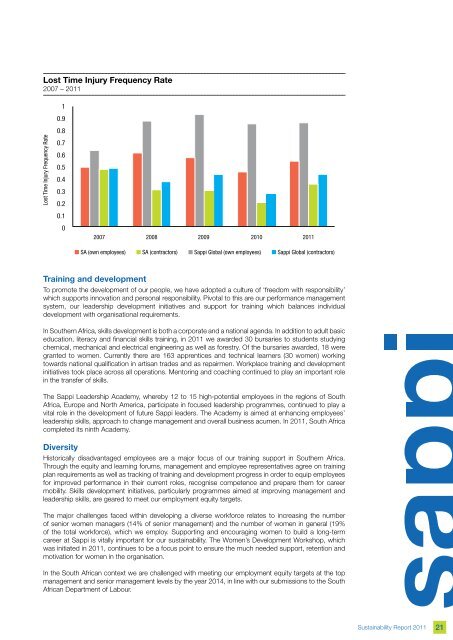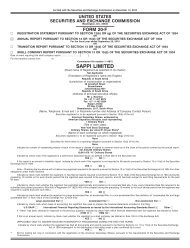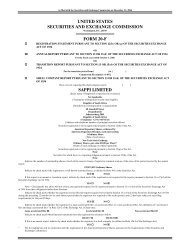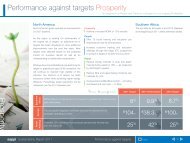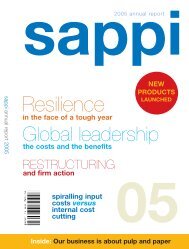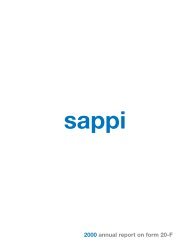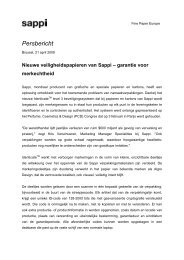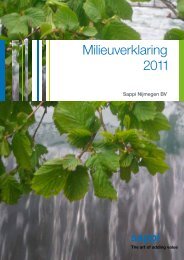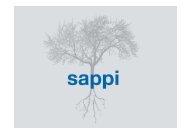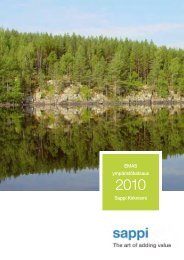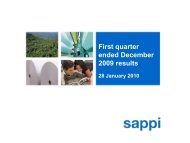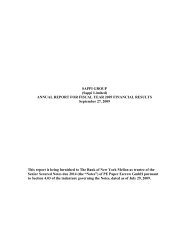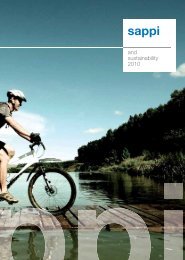Southern Africa - Sappi
Southern Africa - Sappi
Southern Africa - Sappi
Create successful ePaper yourself
Turn your PDF publications into a flip-book with our unique Google optimized e-Paper software.
Lost Time Injury Frequency Rate<br />
2007 – 2011<br />
Lost Time Injury Frequency Rate<br />
1<br />
0.9<br />
0.8<br />
0.7<br />
0.6<br />
0.5<br />
0.4<br />
0.3<br />
0.2<br />
0.1<br />
0<br />
2007<br />
2008 2009 2010 2011<br />
n SA (own employees) n SA (contractors) n <strong>Sappi</strong> Global (own employees) n <strong>Sappi</strong> Global (contractors)<br />
Training and development<br />
To promote the development of our people, we have adopted a culture of ‘freedom with responsibility’<br />
which supports innovation and personal responsibility. Pivotal to this are our performance management<br />
system, our leadership development initiatives and support for training which balances individual<br />
development with organisational requirements.<br />
In <strong>Southern</strong> <strong>Africa</strong>, skills development is both a corporate and a national agenda. In addition to adult basic<br />
education, literacy and financial skills training, in 2011 we awarded 30 bursaries to students studying<br />
chemical, mechanical and electrical engineering as well as forestry. Of the bursaries awarded, 18 were<br />
granted to women. Currently there are 163 apprentices and technical learners (30 women) working<br />
towards national qualification in artisan trades and as repairmen. Workplace training and development<br />
initiatives took place across all operations. Mentoring and coaching continued to play an important role<br />
in the transfer of skills.<br />
The <strong>Sappi</strong> Leadership Academy, whereby 12 to 15 high-potential employees in the regions of South<br />
<strong>Africa</strong>, Europe and North America, participate in focused leadership programmes, continued to play a<br />
vital role in the development of future <strong>Sappi</strong> leaders. The Academy is aimed at enhancing employees’<br />
leadership skills, approach to change management and overall business acumen. In 2011, South <strong>Africa</strong><br />
completed its ninth Academy.<br />
Diversity<br />
Historically disadvantaged employees are a major focus of our training support in <strong>Southern</strong> <strong>Africa</strong>.<br />
Through the equity and learning forums, management and employee representatives agree on training<br />
plan requirements as well as tracking of training and development progress in order to equip employees<br />
for improved performance in their current roles, recognise competence and prepare them for career<br />
mobility. Skills development initiatives, particularly programmes aimed at improving management and<br />
leadership skills, are geared to meet our employment equity targets.<br />
The major challenges faced within developing a diverse workforce relates to increasing the number<br />
of senior women managers (14% of senior management) and the number of women in general (19%<br />
of the total workforce), which we employ. Supporting and encouraging women to build a long-term<br />
career at <strong>Sappi</strong> is vitally important for our sustainability. The Women’s Development Workshop, which<br />
was initiated in 2011, continues to be a focus point to ensure the much needed support, retention and<br />
motivation for women in the organisation.<br />
In the South <strong>Africa</strong>n context we are challenged with meeting our employment equity targets at the top<br />
management and senior management levels by the year 2014, in line with our submissions to the South<br />
<strong>Africa</strong>n Department of Labour.<br />
Sustainability Report 2011 21


